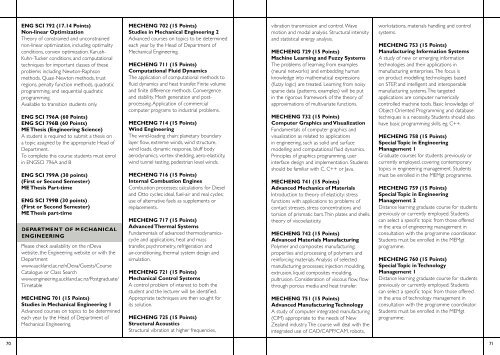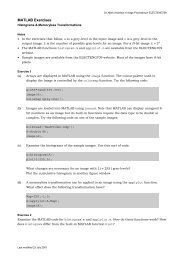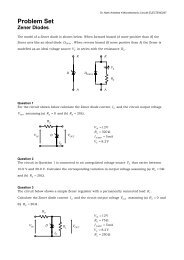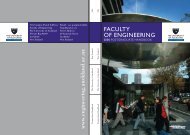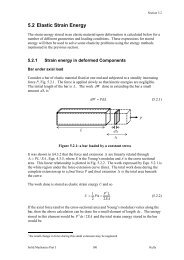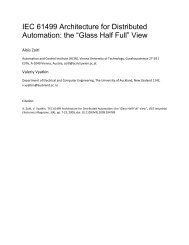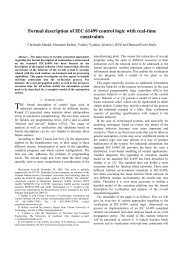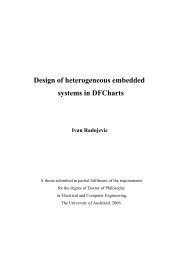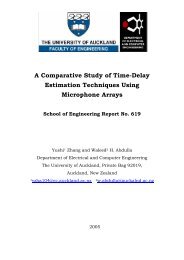www.engineering.auckland.ac.nz faculty of engineering
www.engineering.auckland.ac.nz faculty of engineering
www.engineering.auckland.ac.nz faculty of engineering
Create successful ePaper yourself
Turn your PDF publications into a flip-book with our unique Google optimized e-Paper software.
ENG SCI 792 (17.14 Points)<br />
Non-linear Optimization<br />
Theory <strong>of</strong> constrained and unconstrained<br />
non-linear optimization, including optimality<br />
conditions, convex optimization. Karush-<br />
Kuhn-Tucker conditions, and computational<br />
techniques for important classes <strong>of</strong> these<br />
problems including Newton-Raphson<br />
methods. Quasi-Newton methods, trust<br />
regions, penalty function methods, quadratic<br />
programming, and sequential quadratic<br />
programming.<br />
Available to transition students only.<br />
ENG SCI 796A (60 Points)<br />
ENG SCI 796B (60 Points)<br />
ME Thesis (Engineering Science)<br />
A student is required to submit a thesis on<br />
a topic assigned by the appropriate Head <strong>of</strong><br />
Department.<br />
To complete this course students must enrol<br />
in ENGSCI 796A and B<br />
ENG SCI 799A (30 points)<br />
(First or Second Semester)<br />
ME Thesis Part-time<br />
ENG SCI 799B (30 points)<br />
(First or Second Semester)<br />
ME Thesis part-time<br />
DEPARTMENT OF MECHANICAL<br />
ENGINEERING<br />
Please check availability on the nDeva<br />
website, the Engineering website or with the<br />
Department<br />
<strong>www</strong>.<strong>auckland</strong>.<strong>ac</strong>.<strong>nz</strong>/nDeva/Guests/Course<br />
Catalogue or Class Search<br />
<strong>www</strong>.<strong>engineering</strong>.<strong>auckland</strong>.<strong>ac</strong>.<strong>nz</strong>/Postgraduate/<br />
Timetable<br />
MECHENG 701 (15 Points)<br />
Studies in Mechanical Engineering 1<br />
Advanced courses on topics to be determined<br />
e<strong>ac</strong>h year by the Head <strong>of</strong> Department <strong>of</strong><br />
Mechanical Engineering.<br />
MECHENG 702 (15 Points)<br />
Studies in Mechanical Engineering 2<br />
Advanced courses on topics to be determined<br />
e<strong>ac</strong>h year by the Head <strong>of</strong> Department <strong>of</strong><br />
Mechanical Engineering.<br />
MECHENG 711 (15 Points)<br />
Computational Fluid Dynamics<br />
The application <strong>of</strong> computational methods to<br />
fluid dynamics and heat transfer. Finite volume<br />
and finite difference methods. Convergence<br />
and stability. Mesh generation and postprocessing.<br />
Application <strong>of</strong> commercial<br />
computer programs to industrial problems.<br />
MECHENG 714 (15 Points)<br />
Wind Engineering<br />
The wind-loading chain: planetary boundary<br />
layer flow, extreme winds, wind structure,<br />
wind loads, dynamic response, bluff body<br />
aerodynamics, vortex shedding, aero-elasticity,<br />
wind tunnel testing, pedestrian level winds.<br />
MECHENG 716 (15 Points)<br />
Internal Combustion Engines<br />
Combustion processes; calculations for Diesel<br />
and Otto cycles; ideal, fuel-air and real cycles;<br />
use <strong>of</strong> alternative fuels as supplements or<br />
repl<strong>ac</strong>ements.<br />
MECHENG 717 (15 Points)<br />
Advanced Thermal Systems<br />
Fundamentals <strong>of</strong> advanced thermodynamicscycle<br />
and applications, heat and mass<br />
transfer, psychrometry, refrigeration and<br />
air-conditioning, thermal system design and<br />
simulation.<br />
MECHENG 721 (15 Points)<br />
Mechanical Control Systems<br />
A control problem <strong>of</strong> interest to both the<br />
student and the lecturer will be identified.<br />
Appropriate techniques are then sought for<br />
its solution.<br />
MECHENG 725 (15 Points)<br />
Structural Acoustics<br />
Structural vibration at higher frequencies,<br />
vibration transmission and control. Wave<br />
motion and modal analysis. Structural intensity<br />
and statistical energy analysis.<br />
MECHENG 729 (15 Points)<br />
M<strong>ac</strong>hine Learning and Fuzzy Systems<br />
The problems <strong>of</strong> learning from examples<br />
(neural networks) and embedding human<br />
knowledge into mathematical expressions<br />
(fuzzy logic) are treated. Learning from noisy<br />
sparse data (patterns, examples) will be put<br />
in the rigorous framework <strong>of</strong> the theory <strong>of</strong><br />
approximations <strong>of</strong> multivariate functions.<br />
MECHENG 732 (15 Points)<br />
Computer Graphics and Visualization<br />
Fundamentals <strong>of</strong> computer graphics and<br />
visualization as related to applications<br />
in <strong>engineering</strong>, such as solid and surf<strong>ac</strong>e<br />
modelling and computational fluid dynamics.<br />
Principles <strong>of</strong> graphics programming, user<br />
interf<strong>ac</strong>e design and implementation. Students<br />
should be familiar with C, C++ or Java.<br />
MECHENG 741 (15 Points)<br />
Advanced Mechanics <strong>of</strong> Materials<br />
Introduction to theory <strong>of</strong> elasticity: stress<br />
functions with applications to problems <strong>of</strong><br />
cont<strong>ac</strong>t stresses, stress concentrations and<br />
torsion <strong>of</strong> prismatic bars. Thin plates and shells.<br />
theory <strong>of</strong> viscoelasticity.<br />
MECHENG 742 (15 Points)<br />
Advanced Materials Manuf<strong>ac</strong>turing<br />
Polymer and composites manuf<strong>ac</strong>turing;<br />
properties and processing <strong>of</strong> polymers and<br />
reinforcing materials. Analysis <strong>of</strong> selected<br />
manuf<strong>ac</strong>turing processes; injection moulding,<br />
extrusion, liquid composites moulding,<br />
pultrusion. Consideration <strong>of</strong> viscous flow, flow<br />
through porous media and heat transfer.<br />
MECHENG 751 (15 Points)<br />
Advanced Manuf<strong>ac</strong>turing Technology<br />
A study <strong>of</strong> computer integrated manuf<strong>ac</strong>turing<br />
(CIM) appropriate to the needs <strong>of</strong> New<br />
Zealand industry. The course will deal with the<br />
integrated use <strong>of</strong> CAD/CAPP/CAM, robots,<br />
workstations, materials handling and control<br />
systems.<br />
MECHENG 753 (15 Points)<br />
Manuf<strong>ac</strong>turing Information Systems<br />
A study <strong>of</strong> new or emerging information<br />
technologies and their applications in<br />
manuf<strong>ac</strong>turing enterprises. The focus is<br />
on product modelling technologies based<br />
on STEP, and intelligent and interoperable<br />
manuf<strong>ac</strong>turing systems. The targeted<br />
applications are computer numerically<br />
controlled m<strong>ac</strong>hine tools. Basic knowledge <strong>of</strong><br />
Object-Oriented Programming and database<br />
techniques is a necessity. Students should also<br />
have basic programming skills, eg. C++.<br />
MECHENG 758 (15 Points)<br />
Special Topic in Engineering<br />
Management 1<br />
Graduate courses for students previously or<br />
currently employed, covering contemporary<br />
topics in <strong>engineering</strong> management. Students<br />
must be enrolled in the MEMgt programme.<br />
MECHENG 759 (15 Points)<br />
Special Topic in Engineering<br />
Management 2<br />
Distance learning graduate course for students<br />
previously or currently employed. Students<br />
can select a specific topic from those <strong>of</strong>fered<br />
in the area <strong>of</strong> <strong>engineering</strong> management in<br />
consultation with the programme coordinator.<br />
Students must be enrolled in the MEMgt<br />
programme.<br />
MECHENG 760 (15 Points)<br />
Special Topic in Technology<br />
Management 1<br />
Distance learning graduate course for students<br />
previously or currently employed. Students<br />
can select a specific topic from those <strong>of</strong>fered<br />
in the area <strong>of</strong> technology management in<br />
consultation with the programme coordinator.<br />
Students must be enrolled in the MEMgt<br />
programme.<br />
70<br />
71


